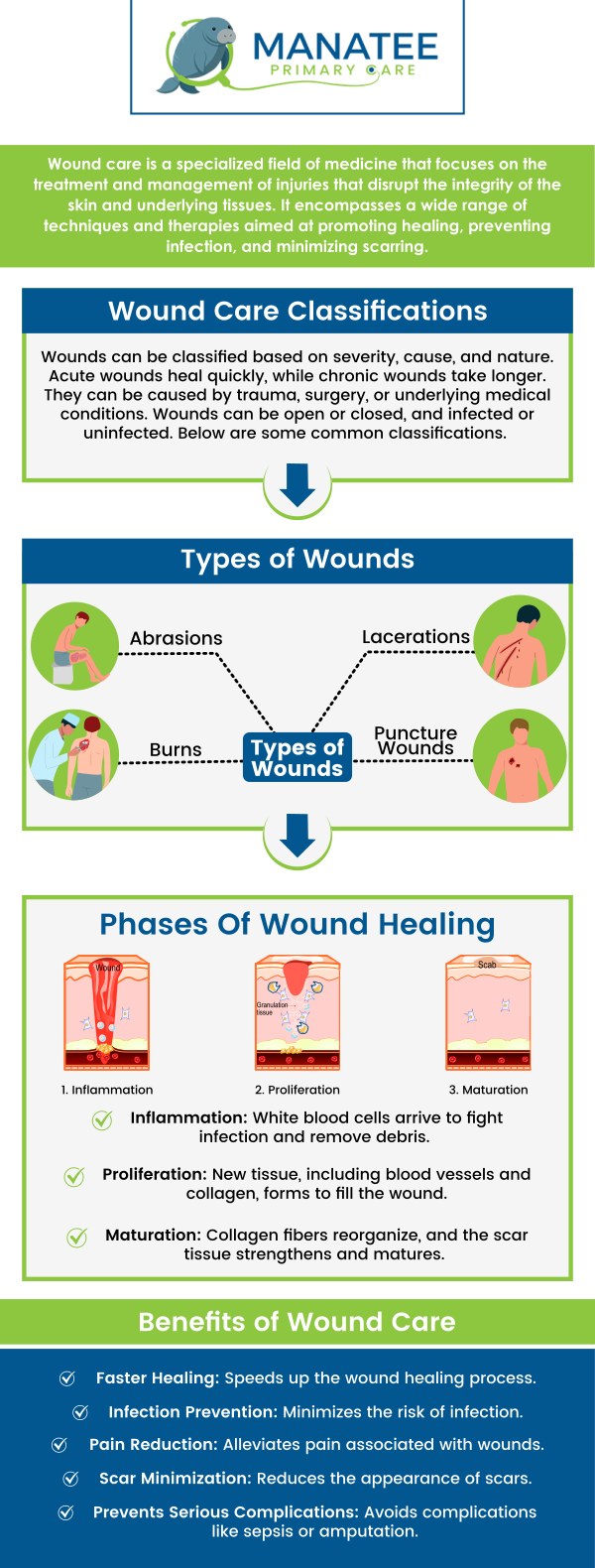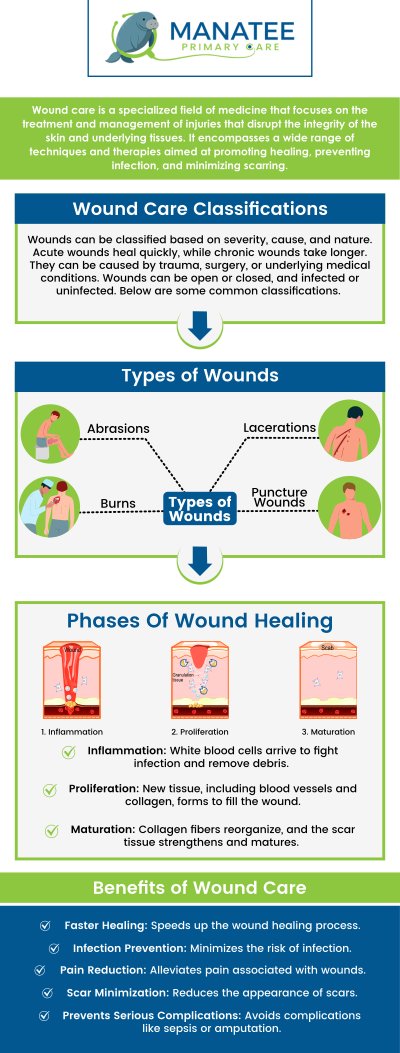Wound Care Doctor in Bradenton, FL
Wound care focuses on assessing and treating injuries like cuts, ulcers, surgical wounds, and pressure sores to promote healing and prevent infection. At Manatee Primary Care, Dr. Ariadnis Urquiza-Milian, MD, CSWP (Certified Wound Specialist Physician) by the American Board of Wound Management, evaluates the severity of wounds and identifies factors that may hinder recovery, such as diabetes or poor circulation. Our dedicated team create tailored treatment plans and monitor progress to enhance healing and reduce complications. For more information, contact us or request an appointment online. We are conveniently located at 6302 Manatee Ave W, Suite D, Bradenton, FL 34209.


Table of Contents:
What are the most common types of wounds that require medical care?
How can I prevent infections in a wound?
When should I seek professional help for a wound?
How can I promote faster healing for my wound?
Wounds can happen unexpectedly and often require prompt, professional attention to ensure proper healing and prevent complications. Dr. Ariadnis Urquiza-Milian, MD, CSWP (Certified Wound Specialist Physician) by the American Board of Wound Management, is equipped to evaluate and treat a wide range of wounds, including those that are deep, large, contaminated, or not healing as expected.
Common Wounds We Treat at Manatee Primary Care:
• Lacerations: These are cuts or tears in the skin, often caused by sharp objects such as knives or broken glass. Lacerations can bleed heavily and may involve underlying tissues, nerves, or blood vessels. Our providers offer expert wound cleaning, suturing, and care instructions to promote safe and effective healing.
• Puncture Wounds: Whether from nails, animal bites, or other sharp objects, puncture wounds can introduce bacteria deep into the tissue and carry a higher risk of infection. We assess the need for tetanus shots, antibiotics, and thorough wound cleaning to minimize infection risks.
• Abrasions: Scrapes from falls or rough surfaces, though often less severe, can become infected if not properly treated. We provide professional cleaning, dressing, and monitoring for signs of infection to support swift and safe recovery.
• Avulsions: These serious wounds, where skin or tissue is forcibly torn away, require immediate medical attention. Our skilled team can help control bleeding and manage tissue loss, providing timely referrals for specialized care if needed.
• Burns: Burns from heat, chemicals, electricity, or radiation can range from mild to severe. We evaluate the depth and extent of burns, administer initial treatment, and coordinate further care if necessary to prevent complications.
• Surgical Wounds: If you have had a surgical procedure and notice signs of infection or delayed healing, our providers can assess your wound and offer appropriate medical intervention to support optimal recovery.
If you have a minor wound or cut, following these steps can help prevent infections and promote faster healing:
• Wash Your Hands First: Before you touch your wound or any supplies, wash your hands thoroughly with soap and water to avoid introducing germs.
• Clean the Wound: Gently rinse the wound with mild soap and water to remove dirt and debris. Avoid scrubbing, as this can damage sensitive tissue.
• Dry the Area: Use a clean towel or sterile gauze to gently pat the area dry.
• Apply Antibiotic Ointment: Use an over-the-counter antibiotic ointment to help reduce the risk of infection.
• Cover with a Sterile Bandage: Protect the wound with a sterile bandage or dressing to keep out bacteria and contaminants.
• Change Dressings Regularly: Replace the bandage at least once a day, or whenever it becomes wet or dirty.
• Monitor for Signs of Infection: Watch for increased redness, swelling, warmth, pain, or discharge. If you notice any of these signs or if the wound isn’t healing after a few days, contact Manatee Primary Care right away.
• Don’t Pick or Touch Unnecessarily: Picking at scabs or touching the wound can introduce new germs and delay healing.
If you or a loved one experiences a wound, it’s important to know when to seek professional medical attention. Certain wounds, such as those caused by animal or human bites, injuries from dirty or rusty objects, or wounds containing debris, require prompt evaluation by our healthcare team. Additionally, if you notice signs of infection, including increasing redness, swelling, warmth, pus, or a foul odor, schedule an appointment with us as soon as possible.
Wounds located on the face, near the eyes, on your hands or feet, or over a joint should also be promptly assessed by a medical professional due to the risk of complications. Our team is experienced in providing the specialized care these injuries require.
If you haven’t had a tetanus shot in the last five years, or if you have underlying health issues such as diabetes or a weakened immune system, it’s especially important to have your wound evaluated at our office, as these factors can affect how well your body heals. Persistent pain, numbness, or loss of function around the wound area are also reasons to contact us.
When in doubt about the severity of a wound, don’t hesitate to reach out to Manatee Primary Care. Our caring providers are here to offer you expert advice and ensure your wound heals safely and properly.
To promote faster recovery from wounds, we recommend the following steps:
• Keep it Clean: Gently wash your wound with mild soap and water to remove debris and lower the risk of infection. This simple step is essential for proper healing.
• Protect the Area: After cleaning, apply an antibiotic ointment if your Manatee Primary Care provider has recommended one. Cover the wound with a sterile bandage and change the dressing regularly to maintain a clean, healing environment.
• Moist Wound Healing: Keeping your wound moist (not dry) can help speed up healing and minimize scarring. Avoid picking at scabs; this can delay healing and increase the risk of infection or scarring.
• Limit Movement: If your wound is located on a joint or an area that moves frequently, try to limit movement to prevent the wound from reopening.
• Support Your Body’s Healing: Eating a diet rich in vitamins A and C, zinc, and protein helps your body repair itself. If you smoke, consider quitting—smoking can significantly slow down wound healing.
• Monitor for Infection: Watch for signs such as redness, swelling, warmth, increased pain, or pus. If you notice any of these, or if your wound isn’t healing as expected, reach out to your Manatee Primary Care provider right away.
If you have any questions about wound care or need further assistance, don’t hesitate to contact Manatee Primary Care. For more information, contact us or request an appointment online. We are conveniently located at 6302 Manatee Ave W, Suite D, Bradenton, FL 34209. We serve patients from Bradenton FL, Parrish FL, Bayshore Gardens FL, Memphis FL, South Bradenton FL, Palmetto FL, and surrounding areas.
Check Out Our 5 Star Reviews


Additional Services You May Need
• Primary Care
• Women’s Health
• Geriatric Health
• Acute Wound Treatment
• Adult Vaccinations
• Allergies
• Annual Physical Exam
• Anxiety Screening
• Birth Control Counseling
• Cancer Screenings
• Cardiovascular Clinic
• Chronic Care Management
• Cold
• Covid-19 Testing
• Diabetes
• Ear Infections
• Urinary Tract Infection
• Immunizations
• Genetic Testing
• Sick Visits
• Hypertension
• In-Office EKG
• Joint Injections
• Laboratory Services
• Medicare Annual Wellness Visit
• Testosterone Monitoring
• Medication Management
• Menopause
• Minor Illnesses
• Minor Injuries
• Minor Laceration Repair
• Skin Infections
• OCD
• Cholesterol Monitoring
• COPD
• STD Testing
• STI Testing
• Wound Care
• View All

Additional Services You May Need
• Primary Care
• Women’s Health
• Geriatric Health
• Wound Care
• Acute Wound Treatment
• Adult Vaccinations
• Allergies
• Annual Physical Exam
• Anxiety Screening
• Birth Control Counseling
• Cancer Screenings
• Cardiovascular Clinic
• Chronic Care Management
• Cold
• Covid-19 Testing
• Diabetes
• Ear Infections
• Urinary Tract Infection
• Immunizations
• Hypertension
• In-Office EKG
• Joint Injections
• Laboratory Services
• Medicare Annual Wellness Visit
• Testosterone Monitoring
• Medication Management
• Menopause
• Minor Illnesses
• Minor Injuries
• Minor Laceration Repair
• Skin Infections
• OCD
• Cholesterol Monitoring
• COPD
• STD Testing
• STI Testing
• Genetic Testing
• Sick Visits
• View All





